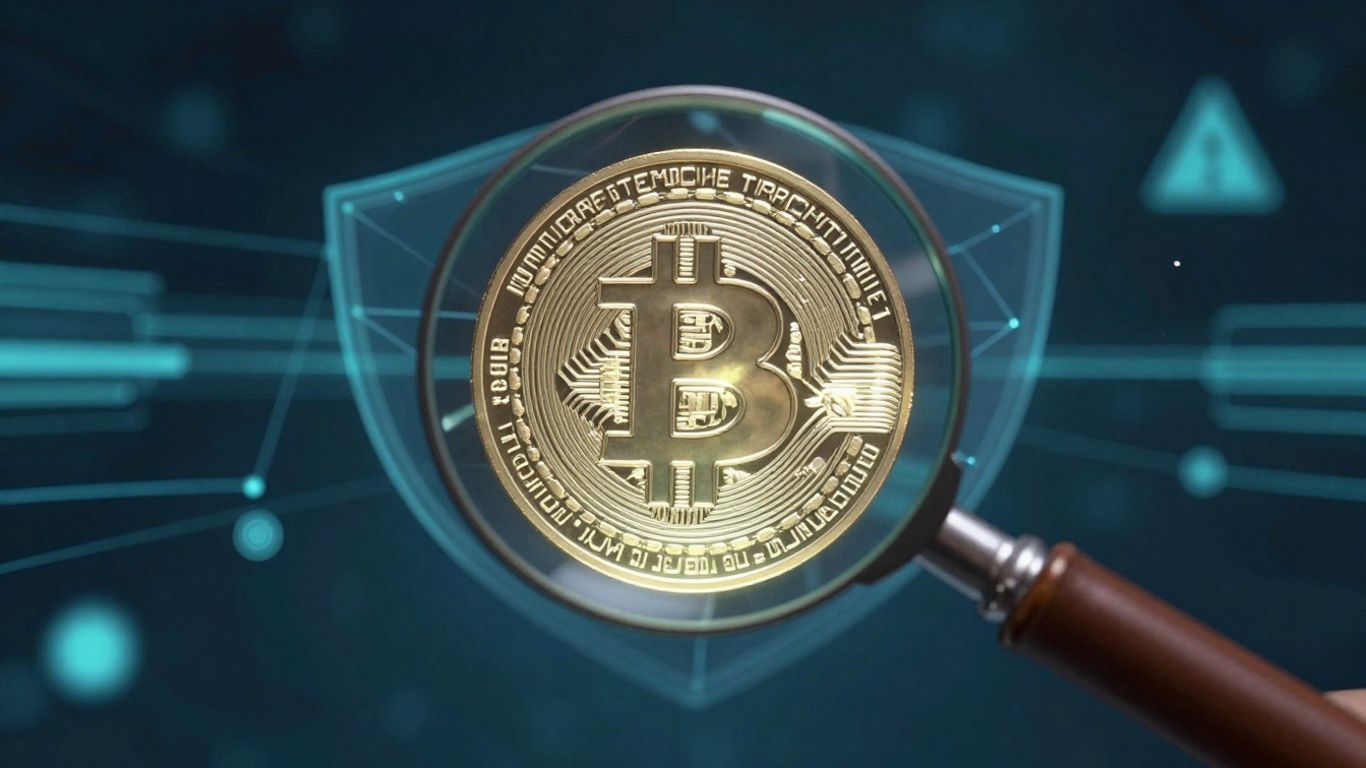[ newsletter ]
Stay ahead of Web3 threats—subscribe to our newsletter for the latest in blockchain security insights and updates.
Thank you! Your submission has been received!
Oops! Something went wrong. Please try again.
Explore top DexScreener alternatives for 2025. Discover DexTools, PooCoin, Jupiter & more for advanced crypto trading insights.





Decentralized exchanges, or DEXs, are a big deal in crypto these days. They let you trade directly from your wallet, which is pretty cool for security and control. But keeping up with all the action across different blockchains and trading pairs can be a headache. DEX Screener is a popular tool for this, giving you real-time market data. However, it's not the only game in town. Different traders need different things, whether it's fancier analysis tools, better support for certain networks, or just an easier-to-use interface. That's why we're looking at some top DEX screener alternatives for 2025 that might be a better fit for your trading style.

DexTools is a pretty solid option if you're looking for something beyond the usual DEX screener. It's been around for a while and packs a good punch when it comes to market analysis tools. Think real-time data, but also a deeper dive into what's happening across different blockchains like Ethereum, BSC, and Polygon.
What really sets DexTools apart for me are its charting capabilities. You can actually add technical indicators, which is a big step up if you're into that kind of analysis. Plus, they have this social sentiment feature that tries to give you a read on what the market mood is, which can be interesting for predicting price moves. It also lets you keep an eye on wallet transactions, which is handy.
However, it's not all free. To get the full experience, especially with wallet tracking and premium notifications, you'll need to subscribe. It seems like DexTools really shines for experienced traders who want those advanced analytical capabilities. The interface can be a bit much if you're just starting out, but for those who know their way around charts and indicators, it's a powerful tool.
Here's a quick look at what it offers:
While DexTools offers a lot for the serious trader, its complexity means it might not be the first stop for beginners. It's definitely geared towards those who appreciate detailed market intelligence and are willing to pay for it.
PooCoin is a platform that really focuses on the Binance Smart Chain (BSC). If you're trading tokens on BSC, this is one of the tools you'll probably come across. It gives you live prices and lets you look at wallets, which is pretty handy for tracking big trades or seeing what might be moving the market. They also track liquidity, which is important for understanding how easy it is to buy or sell a token without messing up the price too much.
PooCoin's main strength is its deep dive into BSC, but that's also its limitation. It doesn't cover other blockchains like Ethereum or Polygon, so if you're spread out across different networks, you'll need other tools. The interface is functional, but it's not as slick as some of the bigger players out there. Still, for anyone heavily involved in the BSC ecosystem, PooCoin is a solid choice for getting specific data.
Here's a quick look at what it offers:
The token itself has a mechanism where 8% of every transaction is taken. Half of that, 4%, goes back to the people holding the token, and the other 4% is just removed from circulation forever. It's a way to reward holders and also reduce the total supply over time.
Geckoterminal, a project from the folks behind CoinGecko, is a pretty straightforward tool for checking out decentralized exchange activity. It came out in 2021 and basically gives you a look at crypto prices, trading volumes, and liquidity across different blockchains. If you're new to this whole DEX tracking thing, Geckoterminal is a good place to start because it's not overly complicated. It covers a bunch of blockchains and updates trading data pretty quickly. You can see token prices, how much is being traded, and how much liquidity is in the pools. While it doesn't have super fancy charting tools like some other platforms, it gets the basic job done without making your head spin. It’s a solid option for getting essential market information without a steep learning curve.
Geckoterminal is completely free to use, which is a big plus. You don't have to pay anything to access its features, making it available to everyone, no matter their budget. Proficient traders requiring sophisticated technical examination together with advanced charting capabilities may discover Geckoterminal to be limited in its complexity.
Here’s a quick look at what it offers:
If you're looking for a simple way to keep tabs on DEX markets without getting bogged down in complex features, Geckoterminal is worth checking out. It's a good starting point for anyone wanting to explore meme coin trading platforms without a steep learning curve.
Uniswap Info is the official analytics platform built specifically for the Uniswap decentralized exchange. It's a pretty straightforward tool that gives you real-time data on all the trading pairs, liquidity pools, and price changes happening directly on Uniswap. Its main strength is its direct connection to Uniswap, which is one of the biggest DEXs out there, making the data very reliable for that specific ecosystem. The interface is pretty clean, so it's easy to keep an eye on trading activity and spot trends within Uniswap.
However, Uniswap Info has a pretty narrow focus. It only shows data for Uniswap pairs. If you're trading on other DEXs or different blockchains, you'll need to use other tools to get that information. It’s great if you’re all-in on Uniswap, but not so much if you want a broader market view.
Here’s a quick look at what it offers:
While it's a solid choice for Uniswap-specific analysis, remember its limitations if your trading strategy involves multiple decentralized exchanges. For those looking to monitor their Uniswap v3 positions, checking out tools that help with liquidity provider earnings can be a good idea.
This platform is really about simplifying how you access and analyze DeFi market information. It’s a tool that tries to make staying informed a bit easier, especially if you're active in the fast-moving crypto markets.
Jupiter is a really interesting platform, especially if you're spending a lot of time in the Solana ecosystem. It's not just another place to check prices; it's more like a complete trading hub that also gives you access to a ton of data. You can actually make trades right there, and it comes with tools to help you decide what to do. What really sets Jupiter apart is its strong focus on Solana. If you're trading tokens on Solana, this is probably one of the first places you'll want to look.
It pulls together liquidity from different places, which often means you can get better prices compared to other platforms. The interface is pretty clean, which is a nice change from some of the busier sites out there. It's a good spot to compare how Jupiter stacks up against other platforms like DexTools [0a5b].
Here’s a quick rundown of what it offers:
Jupiter aims to be a central point for Solana traders, simplifying the process of finding the best prices and executing trades efficiently.
Birdeye.so is another platform that pulls data straight from the blockchain, processing it in real-time so you can get a handle on market trends. It's built for crypto traders and anyone interested in the market. They aim to give users an edge by providing clear, data-driven insights. If you're looking to get more out of your crypto trading, Birdeye offers a few ways to do that.
They also have a feature that lets you launch and trade new tokens, with a system where liquidity is added and then burned when a token hits a certain market cap. This is meant to help keep the ecosystem healthy. The platform's focus is on making blockchain data understandable and useful for making trading decisions. It's about giving you the information you need without making it overly complicated. You can check out other tools for analyzing decentralized exchanges like DEX Screener to compare features.
Solscan is a pretty straightforward tool if you're looking to get a handle on what's happening on the Solana blockchain. It's basically a data analytics platform that gives you real-time information. Think of it as a way to see transactions, token details, and general activity without needing to be a blockchain wizard yourself.
It’s a free service, which is always a plus when you’re just starting out or trying to keep costs down. If you're specifically interested in the Solana ecosystem, Solscan is a good place to start your research. It’s a solid option for keeping tabs on the Solana network without a lot of fuss.
Here’s what you can do with Solscan:
Solscan functions as a Solana blockchain explorer but additionally provides information about market data and trading pair features. It's not as flashy as some other platforms, but it gets the job done for basic on-chain data.

Apespace is a platform that really tries to give users a leg up when it comes to finding new tokens. It's known for offering early access to token launches and investment chances that aren't usually out in the open. Think of it as getting a peek behind the curtain at promising projects before most people even know they exist. This can be a big deal if you're looking to get in on the ground floor.
They also put a good amount of effort into making the site easy to use. Even if you're pretty new to the crypto scene, you shouldn't have too much trouble figuring out how to track your investments or set up alerts. Security is another thing they talk about a lot, which is always good to hear when you're dealing with digital assets.
Apespace aims to connect projects with investors, providing tools for fundraising and managing tokens. It supports various blockchains and focuses on being transparent and fair. While it's not strictly a "screener" in the same way some others are, its focus on early access and project discovery makes it a solid alternative for those wanting to find the next big thing. It's built on the idea of making things accessible and secure for everyone involved.
Here’s a quick look at what you can find:
It’s a tool that tries to make staying informed a bit easier, especially if you're active in the fast-moving crypto markets. For anyone looking to get a better handle on the DeFi landscape, checking out tools like this DEX screener can be a good move.
Bogged Finance, particularly its BogCharts feature, is a solid contender for tracking activity on the Binance Smart Chain (BSC). It’s designed to help you make smarter investment decisions by giving you a clear view of what's happening. They're also planning to expand to other blockchains like Polygon and Ethereum, which is good to see.
One of the neat things about Bogged Finance is its BogSwap. It's built to route your trades through different decentralized exchanges (DEXs) to get you the best possible outcome. It’s like having a smart assistant for your trades. You can also connect your wallet directly to BogCharts to keep an eye on your holdings, seeing which tokens are doing well and which ones aren't. It’s a pretty straightforward way to manage your crypto assets.
Bogged Finance uses its own token, BOG. If you hold BOG, you can get access to premium features across their platform, which can really add to your trading toolkit. It’s a way to get more out of the service.
The whole ecosystem is built around the BOG token, which acts as a key to unlock enhanced functionalities. Owning BOG means you get access to premium features, making your experience on the platform more robust and potentially more profitable.
Here’s a quick look at what you can do:
If you're looking for a tool to help you understand the BSC market better, Bogged Finance is definitely worth checking out. It’s a good option for anyone trying to get a handle on their DeFi investments, and you can find out more about other tools in this DeFi market analysis space.
So, we've checked out a few different ways to keep tabs on the decentralized exchange world. DEX Screener is a popular choice, no doubt, but it's not the only game in town. Depending on what you're looking for – maybe more detailed charts like DexTools, a simpler layout like Geckoterminal, or even specialized data for networks like Solana from Jupiter or Birdeye – there are other options. The best tool for you really just depends on how you trade and what information matters most. It’s worth taking a look at these alternatives to see which one helps you make smarter moves in the fast-paced crypto market.
DEXs, or Decentralized Exchanges, let you trade crypto straight from your digital wallet, cutting out middlemen. A DEX screener is a tool that helps you watch what's happening on these exchanges, like price changes and how much trading is going on, across many different crypto networks. It's like a dashboard for the decentralized trading world.
While DEX Screener is popular, some traders want more advanced tools for deeper analysis. Others might prefer simpler features or better support for specific crypto networks that DEX Screener doesn't focus on as much. It really depends on what each trader needs for their style.
These tools show you which coins are being traded a lot or have prices going up quickly. By looking at the live data and charts they provide, you can spot coins that are becoming popular really fast. It's a way to see what's catching on in the market.
Yes, many DEX screeners, including DEX Screener itself, have mobile apps. This means you can check prices and trading information right on your phone, no matter where you are. It makes it easy to stay updated on the go.
Locked liquidity means the money put into a trading pair on a DEX is held safely for a set amount of time. This is a good sign because it makes it much harder for the people who created the coin to suddenly take all the money and disappear, which is a scam called a 'rug pull'. It shows the project is more trustworthy.
You can use them to find coins that are getting popular, check if they have a lot of trading activity, and look at price charts for good times to buy or sell. Watching big trades from large investors, often called 'whales', can also give you clues about where the price might go next.


